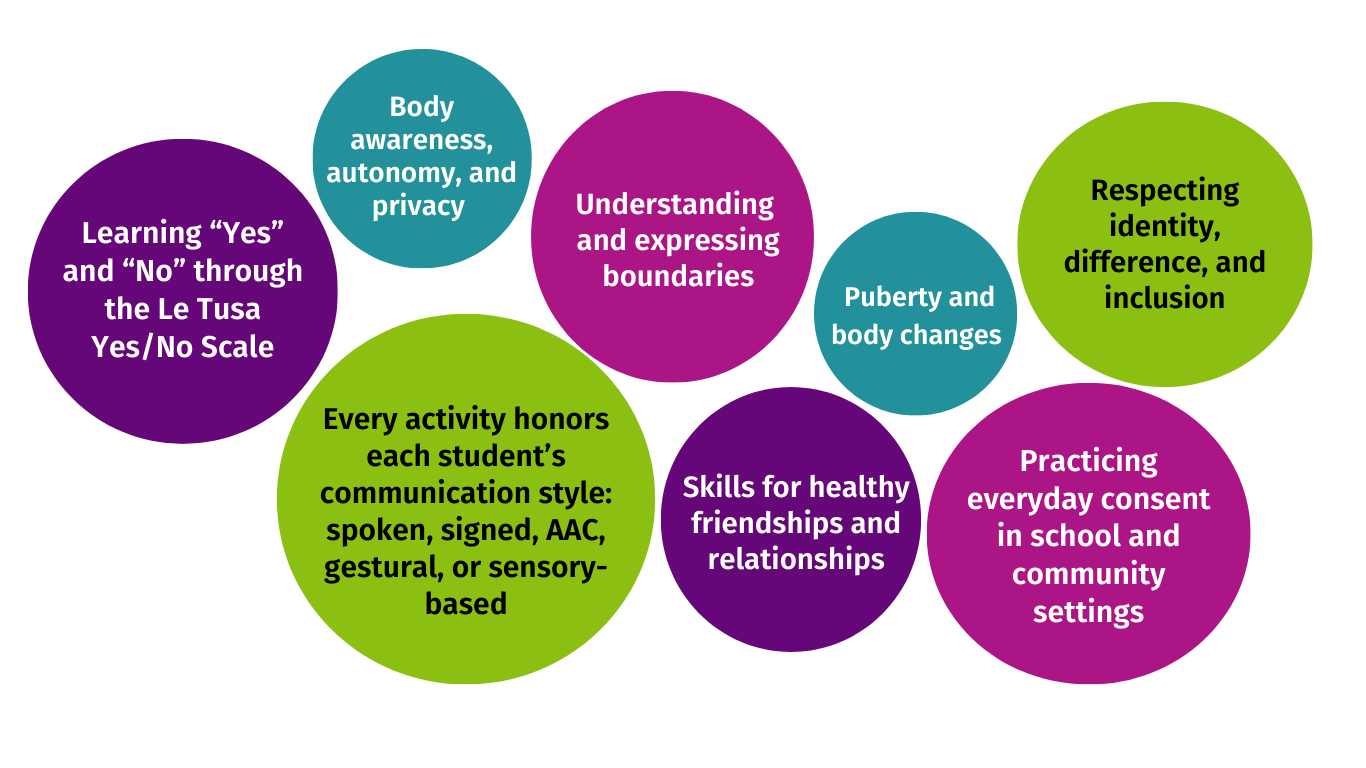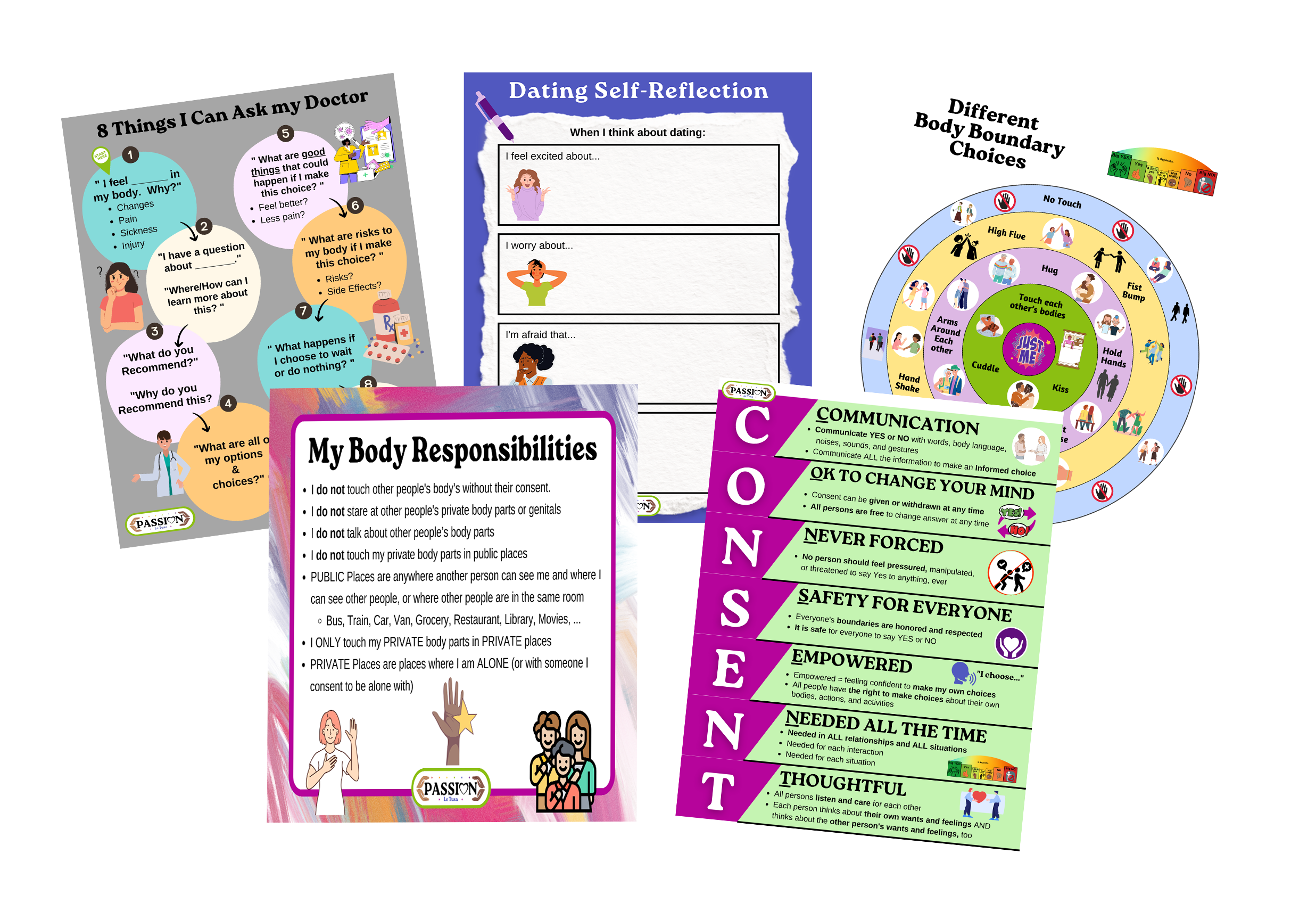Sex Education & Relationship Skills for Schools
Comprehensive Healthy Relationship & Sexuality Education
Le Tusa ® partners with schools to bring disability-affirming, consent-based relationship and sexuality education to students, families, and staff. Our programs center connection, communication, and autonomy for every learner—honoring all forms of communication and expression.
Grounded in social and disability justice, Le Tusa’s curricula support neurodivergent and disabled students to learn about consent, identity, emotions, and relationships through safe, inclusive, and engaging lessons designed for diverse learning and communication styles.
Le Tusa’s Education Model is:
• Person-centered and relationship-centered.
• Disability-affirming and trauma-sensitive.
• Developmentally aligned.
• Accessible for diverse learners.
• Community-wide.
• Rights-based.
Our educators, clinicians, and relationship-skills coaches work alongside school teams to create environments where boundaries, consent, and emotional safety are practiced every day—not just taught.
Offerings Tailored for Every Age Group!
-
Focus: Building awareness, safety, and communication
Uses songs, games, role-play with dolls or puppets, and feeling check-ins.
Teaches the basics of yes/no, consent, body awareness, privacy, and kind friendships.
Emphasizes learning medically accurate words for body parts and understanding that all bodies are good bodies.
Communication supports include AAC, visuals, and tactile tools.
The tone is playful, reassuring, and curiosity-driven.
-
Focus: Exploring identity, emotions, and growing independence
Teaches the basics of yes/no, consent, body awareness, privacy, and kind friendships.
Emphasizes learning medically accurate words for body parts and understanding that all bodies are good bodies.
Uses interactive “choice stations,” group games, and the Courage & Curiosity question box.
Builds a deeper understanding of everyday consent, boundaries, emotions, and inclusion.
Introduces puberty, digital safety, and respecting identity and expression.
Students practice communication and advocacy skills in real-life scenarios.
Encourages reflection and discussion—what feels right, what doesn’t, and why.
-
Focus: Practicing decision-making, respect, and self-advocacy
Teaches the basics of yes/no, consent, body awareness, privacy, and kind friendships.
Emphasizes learning medically accurate words for body parts and understanding that all bodies are good bodies.
Uses interactive “choice stations,” group games, and the Courage & Curiosity question box.
Uses choice-based learning, scenario role-plays, and group reflection activities
Centers consent and boundaries in more complex relationships (friendships, dating).
Covers identity, body rights, privacy, safer sex, and healthy vs. unhealthy relationships.
Builds confidence in communication—spoken, signed, AAC, or digital.
Focuses on preparing for adulthood, autonomy, and informed choices.
Core Student Learning Themes
(Left to right) Purple: Learning “Yes” and “No” through the Le Tusa Yes/No Scale. Teal: Body awareness autonomy, and privacy. Green: Every activity honors each student’s communication style- spoken, signed, AAC, gestural, or sensory-based. Fuchsia: Understanding and expressing boundaries. Purple: Skills for healthy friendships and relationships. Teal: Puberty and body changes. Green: Respecting identity, difference, and inclusion. Fuchsia: Practicing everyday consent in school and community settings.
Additional Pairings!
Parent & Family Education
Parents and caregivers participate in a web based workshop series with one-on-one consultations with Le Tusa educators to individualize and collaborate more closely with families and support systems.
These sessions help families:
Understand Le Tusa’s Yes/No Scale and how to use it at home
Learn the core curriculum themes by age group
Build shared language around consent, boundaries, and safety
Practice reflection, discussion, and supportive communication with their child
Families receive resources, take-home tools, and activity guides
A La Carte Menu – Custom Topics Selected by Community Choice
Each school community can choose extra workshop topics that meet their specific needs or student interests. These can be added to any cohort series for extended learning.
Examples include:
Elementary: Safe and unsafe touch, playing together, hurt feelings, sharing.
Middle School: Crushes and attraction, teasing and bullying, starting conversations.
High School: Social media and safety, dating skills, safer sex, break-ups, consent online.
The A La Carte Menu lets schools tailor the program to what matters most to their students and families — keeping learning relevant, inclusive, and responsive to the school’s community.
Staff & Educator Training
Le Tusa trains teachers and staff to sustain a school-wide culture of respect and consent.
Through reflective learning, role-plays, and practical scripts, staff learn to:
Model consent and boundaries in everyday interactions
Teach with inclusive, trauma-sensitive methods
Address tough questions with confidence and compassion
Build consistent messaging across the school community
Training includes feedback loops and coaching to help integrate new skills over time.
Why Sex Ed Matters
Students with developmental differences have the same rights to learn about their bodies, relationships, and safety as all peers.
By partnering with Le Tusa, schools commit to:
Building safer, more inclusive environments
Preventing abuse through informed, ongoing consent education
Empowering students to express their needs and boundaries
Strengthening relationships among students, families, and staff
Every school community is unique.
Le Tusa offers several ways to implement Healthy Relationship & Sexuality Education so that the values of autonomy, consent, and inclusion reach every student, educator, and family.
Check out the 3 Models below to explore which may be a preferred approach for your school community!
Click Each to learn more!
Implementation Models for Schools
Cascade Model
Building lasting change through shared learning.
Pilot Cohort
Start small, learn together, grow intentionally.
Community Wide Launch
A school-wide commitment from day one.
Shared Outcomes Across All Models
Regardless of the structure a school chooses, each partnership with Le Tusa aims to:
Build consistent language for consent, communication, and boundaries
Strengthen teacher confidence and family engagement
Support student autonomy and self-advocacy
Foster inclusive, rights-based environments where every person’s “yes” and “no” is heard and respected.
Resources & Materials
Le Tusa provides a full set of inclusive, accessible learning materials designed for diverse learners and communicators. Each school partnership includes both digital and print resources to support teaching, learning, and reflection across all settings.
All materials are disability-affirming, trauma-sensitive, and customizable to fit each classroom’s needs—helping students, families, and educators build shared language and lasting skills for healthy, respectful relationships.
-
Le Tusa Yes/No Scale visuals and activity sheets for practicing everyday consent
-
Lesson slides, videos, and plain language handouts for each workshop
-
Visual supports and AAC-compatible icons for students who use alternative communication
-
Games, cards, and role-play tools for hands-on learning and practicing real-life skills
-
Parent and caregiver guides with discussion questions and home activities
-
Teacher and staff toolkits with scripts, reflection prompts, and classroom activities
-
Courage & Curiosity Container (digital and physical version) for anonymous questions
-
Access to follow-up materials through Le Tusa’s digital resource library
Partnership & Rates
Every school community is different — and so is every Le Tusa partnership.
Our rates reflect the depth of facilitation, curriculum design, and collaborative planning that goes into building a consent-based, disability-affirming learning environment.
Le Tusa offers several implementation models and rate options based on your goals, timeline, and community needs. Whether your school is beginning with one cohort, planning a full-school rollout, or building staff capacity through the Cascade Model, we’ll work with you to create a plan that fits your vision.

Ready to explore what’s possible? Partner With Le Tusa!
Le Tusa customizes curriculum and training for each school’s community.
Together, we can create classrooms where every student is seen, heard, and supported to make informed choices.
Click the Typeform link and share a few details about your school, the age groups you serve, and your goals for relationship and sexuality education. Bring Le Tusa’s Healthy Relationship & Sexuality Education to your school!











